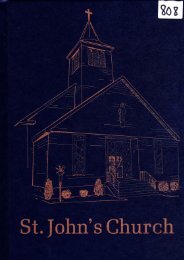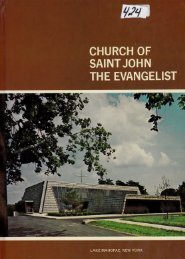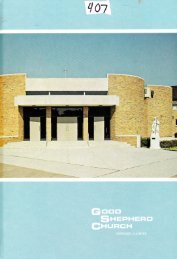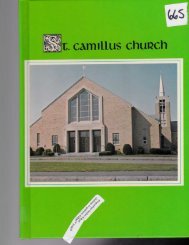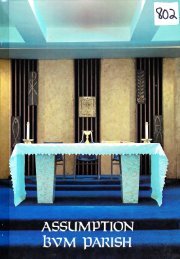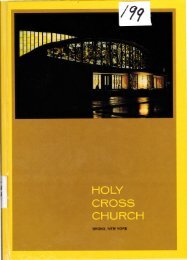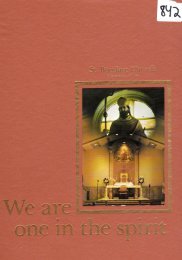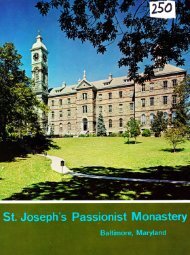Untitled - Digitizing America
Untitled - Digitizing America
Untitled - Digitizing America
Create successful ePaper yourself
Turn your PDF publications into a flip-book with our unique Google optimized e-Paper software.
Elizabeth Seton College in Yonkers, New<br />
York.<br />
Her challenges were far from purely spiritual. She<br />
dealt effectively with the problems of a<br />
neglectful father, a despondent husband, ne'erdo-well<br />
sons, high-handed clerics, feuding religious,<br />
and constant creditors. Her lot was never<br />
easy and seldom pleasant. Her salvation, in fact<br />
her sanctity, was worked out in the endless toil of<br />
an <strong>America</strong>n wife and mother, widow and nun.<br />
More than a century and a half ago, Mother Seton<br />
called her daughters together to bid them farewell'<br />
And she left her loved ones a final phrase that<br />
remains as part of her legacy to all: "be children of<br />
the Church."<br />
Over one million pilgrims traveled to the historic<br />
city of Philadelphia in August, 1976, for<br />
the Forty-f irst Eucharistic Congress, a worldwide<br />
spiritual assembly that gave the faithf ul<br />
of all lands deeper understanding of the diversity<br />
of culture and the unity of the Holy<br />
Spirit.<br />
Seven Congress-sponsored conferences and<br />
seminars collected the wisdom and experience<br />
of prelates and lay men and women outstanding<br />
in the causes of social justice.<br />
During the week-long gathering, forty-f ive different<br />
liturgies featured national dress,<br />
customs, and languages of the multi'ethnic<br />
participants in the Congress.<br />
The planners of the Eucharistic Congress<br />
had instructed that no event was to have an<br />
air of "triumphalism" about it. Those who attended<br />
the Eucharistic Congress, and experienced<br />
the dedication of the great crowds,<br />
could sense a spiritual uplift and unity that<br />
far outshone any PettY emotion.<br />
Catholics observed <strong>America</strong>'s Bicentennial<br />
Year, 1976, with liturgical celebration, studies<br />
in church history, and a nation-wide ref<br />
lection on justice that culminated in 1977 in<br />
a five-year program of study and action to<br />
better realize social justice in our nation and<br />
world.<br />
The broadest of consultations between bishops<br />
and laity ever undertaken in the<br />
<strong>America</strong>n Church involved over 800,000<br />
Catholics in parish, diocesan, and regional<br />
conferences during the 1975 Holy Year. ln<br />
October, 1976, over thirteen hundred<br />
delegates carried to a national conference in<br />
Detroit, entitled A Call To Action, over 180<br />
specific recommendations of Church policy<br />
in eight subject areas: justice in the Church,<br />
personhood, neighborhood, the family, work,<br />
nationhood, humankind, and ethnicity and<br />
race,<br />
The recommendations of fered new approaches<br />
to realizing social goals to which<br />
the Catholic Church has long been committed,<br />
such as the elimination of racial dis'<br />
crimination and poverty, the guaranteeing of<br />
rights to the unborn, the commitment of the<br />
parish church to its neighborhood, and the<br />
support of family life. Other recommendations<br />
reflect newer concerns, within and<br />
outside the Church, such as the expansion of<br />
women's ministries; the necessity of<br />
evaluating our entire economic system; the<br />
quality and morality of the public schools;<br />
and the need for more ef fective adult<br />
religious education programs.<br />
Some of the recommendations remain untenable<br />
in the light of Church teaching, concluded<br />
the National Conference of Catholic Bishops<br />
in their response to A CallTo Action. Bul



